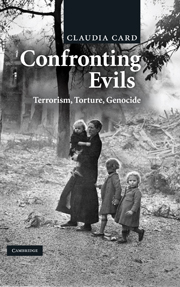Book contents
- Frontmatter
- Contents
- Preface and acknowledgements
- List of acronyms and abbreviations
- PART I The concept of evil
- PART II Terrorism, torture, genocide
- 5 Counterterrorism
- 6 Low-profile terrorism
- 7 Conscientious torture?
- 8 Ordinary torture
- 9 Genocide is social death
- 10 Genocide by forced impregnation
- Bibliography
- List of films referred to
- List of websites for international documents
- Index
5 - Counterterrorism
Published online by Cambridge University Press: 05 June 2012
- Frontmatter
- Contents
- Preface and acknowledgements
- List of acronyms and abbreviations
- PART I The concept of evil
- PART II Terrorism, torture, genocide
- 5 Counterterrorism
- 6 Low-profile terrorism
- 7 Conscientious torture?
- 8 Ordinary torture
- 9 Genocide is social death
- 10 Genocide by forced impregnation
- Bibliography
- List of films referred to
- List of websites for international documents
- Index
Summary
Finally, one may ask whether the concept of justice implies that a religious sect which rejects the principle of equal liberty should itself be tolerated, that is, given the constitutional liberty which it would deny, had it the means, to others. (Rawls 1999b, p. 92)
“Counterterrorism” in the United States today has come to be regarded as a military concept. Yet it is unclear to what extent a military model is really the model that has been used by the US for fighting terrorism since the attacks of September 11, 2001 (hereafter, 9/11; Luban 2002, pp. 9–14). Military policies are governed by International Humanitarian Law (IHL), which rules out most terrorism. Counterterrorist measures need not be terrorist. But the temptation for responders to use terrorist means is there. This chapter explores that temptation and takes up the question of whether there can be a moral justification, or at least a moral excuse, for a government-sponsored program to fight terrorism with terrorism.
John Rawls had a lifelong concern with issues of religious freedom and intolerance. In his social and political philosophy course at Harvard and in his writings he addressed the question of whether principles of justice impose any obligation to tolerate even those who are intolerant (Rawls 1999b, pp. 92–94). By the intolerant, he had in mind religious sects (although the same issue arises for political sects) that do not accept the principle of equal liberty.
- Type
- Chapter
- Information
- Confronting EvilsTerrorism, Torture, Genocide, pp. 123 - 148Publisher: Cambridge University PressPrint publication year: 2010



